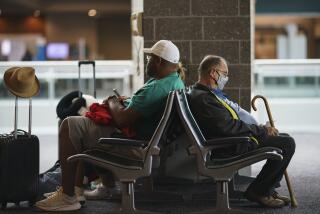Executive Travel : Caution While Traveling Should Be of Utmost Concern
- Share via
Personal safety is one of those areas business travelers know they should think about when planning a trip. But, preoccupied with the details of getting from airport to hotel to meeting, they all too often overlook it.
Business travelers are especially attractive targets for criminals, said Terry Riley, a psychologist and founder of Applied Psychology, a Santa Cruz-based company specializing in safety consulting for business travelers. Not only do they look like they might be carrying money, they are also unlikely to return to testify if they are from out of town.
The publicity surrounding the killing of two German tourists in their rental car in Miami last summer served to heighten awareness about safety while traveling. Here are some practical suggestions from Riley and the American Hotel and Motel Assn. that can make your travel safer.
This week, a look at driving and staying in hotels. Next week, a look at taxis, safety on the streets and what to do if you are attacked.
Rental Cars
Muggers and robbers look for their victims by staking out airport rental desks and hotel check-in counters. Therefore, these are the first lines of defense for business travelers.
“Remember, it’s hard to tell who the criminals are,” Riley said. Notorious serial killer Ted Bundy, for example, was a handsome man who disarmed his victims with charm before attacking them.
“Before you get into your rental car, you should know where you are going,” Riley said. Get a map in advance and study it, or call for directions.
You can also ask the local police whether there have been any problems reported at the hotel where you plan to stay. Don’t rely on the rental car agent to give you directions. Someone lurking nearby could get a preview of where you’re going and how you plan to get there.
Two cardinal rules apply everywhere: Don’t travel at night and don’t travel alone if you can help it. Keep your maps in the glove compartment so they don’t advertise that you’re from out of town.
Criminals watch for people who look tired and could be caught off guard, Riley said. If you stop for coffee or a rest off the freeway, pull yourself together and look alert.
An attacker might attempt to pull you over down the road by signaling you that there is a problem with your car. Keep your wits about you at all times.
If your car has a phone, make sure it works and you know how to use it. Drive defensively and don’t let yourself get boxed in.
Having some maneuvering room will give you a chance to drive away quickly if someone bumps into you in a fraudulent attempt to stop you.
Hotels
Once you get to your hotel, never say your name at the desk, Riley advised. Put your credit card down and say, “I have a reservation.” Once a criminal knows your first name, he or she has a powerful weapon.
He or she can approach you and say, “Carol, I haven’t seen you in such a long time.” That distracts you and lowers your guard, two things a person up to no good can turn to advantage.
In fact, Riley recommends that people not put their first names on their credit cards at all. And when a woman makes a reservation, he suggests, she should put Mr. in front of her name. The less you stand out as a woman traveling alone on business, the better.
If the desk clerk or person helping with your baggage asks you what you’re in town for or what you have planned, say something noncommittal, such as, “I’m in town on business, thanks for asking.”
Again, you don’t want to broadcast to anyone within earshot anything about your plans, or where you’ll be and when.
And remember not to sign your name and room number on the bill when you go to the hotel’s bar or restaurant. Those checks often sit by the register, and anyone can see what room you’re in, Riley said.
If you order room service and you’re alone, don’t put your tray with its one plate, one set of silver and one glass out in the hall when you’re done. It advertises the fact that you’re in there by yourself.
When you get to your room, make sure it’s in a hallway where there is foot traffic and where you can see other doors.
Always keep the doors locked and never open them to anyone. Although most people do this intuitively at home, they may not be as careful at a hotel.
If someone comes to the door and says he is from maintenance and wants to check the plumbing, the American Hotel and Motel Assn. recommends calling security or the front desk to verify that the hotel sent someone and to get the person’s name.
The association also recommends making sure when you check in that the hotel will not give out any additional keys.
Be cautious when you enter a room. If you are alone, put your bags down against the door so it can’t close until you are sure the room is secure.
Next, make sure the phone works by calling the front desk and asking what time checkout is, Riley said. “That may be your lifeline.”
When you go out, leave the TV on and always take your key.
Also, use the hotel’s safe deposit box for valuables, said Kathryn Cochran, spokeswoman for the hotel association. Better yet, don’t take them with you. For more information, contact Applied Psychology at (800) 492-5050 or the American Hotel and Motel Assn. at (202) 289-3132.
More to Read
Sign up for The Wild
We’ll help you find the best places to hike, bike and run, as well as the perfect silent spots for meditation and yoga.
You may occasionally receive promotional content from the Los Angeles Times.






